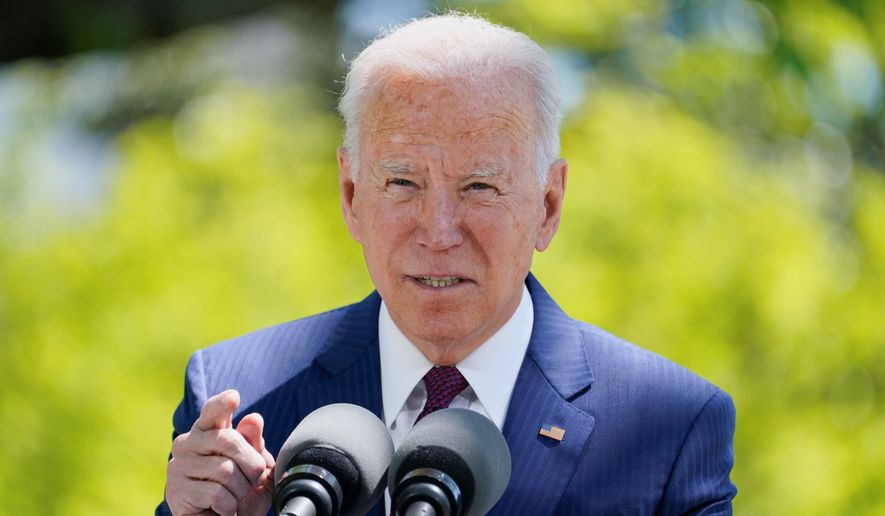President Biden’s promotion of an all-out federal alliance with labor unions and of whole-of-government mobilizations on fronts from racial justice to climate change is testing America’s appetite for an activist administration.
Mr. Biden established a Cabinet-level task force to plan a federal strategy to empower unions — not simply promote the right to join one.
His Justice Department launched investigations to root out racism in the Minneapolis and Louisville police departments.
He embarked on a massive spending agenda that expanded federal safety net programs and seeks to add government benefits for college, child care, health care and paid sick leave.
“Big government is back, and it’s back under the auspices of this quote-unquote national emergency,” said Mark Mix, president of the National Right to Work Legal Defense Foundation.
The activist approach to governing imbues Mr. Biden’s union agenda.
The president gave multiple plugs for unions in his address to a joint session of Congress and urged lawmakers to pass the “PRO Act,” which would nullify right-to-work laws across the country and expand union power.
“Send it to my desk so we can support the right to unionize,” he said. “Wall Street didn’t build this country. The middle class built the country, and unions built the middle class.”
Within hours of taking office, Mr. Biden pushed out the National Labor Relations Board (NLRB) general counsel and ousted his replacement soon afterward.
Mr. Biden tacitly endorsed an unsuccessful attempt by Amazon workers in Mississippi to unionize and included union-friendly language throughout major economic proposals.
He issued an executive order making it the policy of the federal government to support and promote unionization and set up the Cabinet-level task force.
“It is unprecedented,” said Robert Bruno, director of the Labor Studies Program at the University of Illinois at Urbana-Champaign. “He’s saying it’s the role of the federal government, and we’re going to embed that in the work that we do.”
Mr. Bruno said Mr. Biden isn’t taking a “siloed” approach and leaving labor issues up to Labor Secretary Marty Walsh or the NLRB, for example.
“It’s weaved into the purpose of the role of the federal government to address workplace inequality,” he said. “So that’s a profound statement and, if it’s backed up by action, it is a re-imagining and situating of the role of the federal government that we haven’t seen in decades and decades.”
Beyond the union push, Mr. Biden is extending the government’s size and reach through massive spending plans. The price tag for his early legislative agenda on coronavirus relief, infrastructure and social programs clocks in at roughly $6 trillion.
The president defended his expansive approach, saying private businesses can’t reshape the country’s roads and bridges by themselves.
“I don’t have any inordinate faith in government, but there are certain things that only the government can do,” Mr. Biden told NBC News. “Is the private sector going to go out and build billions of dollars’ worth of highways, ports, airports, bridges? Are they going to do that? And so these are things that only government can really do.”
He pointed to the $1.9 trillion relief package as a major reason for a budding economic recovery.
“Look how rapidly it’s recovered since we passed the last piece of legislation,” he said. “If we don’t invest in this country, we’re going to fall behind even further.”
Polling is mixed on how much the public wants to see the federal government do.
Fifty-six percent of U.S. voters say they’d prefer to pay lower taxes and have a smaller government, compared to 36% who preferred higher taxes and a bigger government, according to a recent Fox News poll.
Results from a recent NBC News survey were basically flipped: 55% of Americans said the government should do more to solve the country’s problems, compared to 41% who said it’s doing too much.
On labor and taxes, many small businesses say they want to see Mr. Biden and the Democrats back off.
Seven in 10 small business owners said the PRO Act would put them out of business or force them to hire fewer workers, according to a new survey from Alignable, an online small business referral network.
“When it comes right down to it, the PRO Act could threaten the American Dream of owning your own business, while also crippling the small business economy, which is just starting to rebound from COVID’s devastation,” said Eric Groves, CEO and co-founder of the group.
The Biden administration is extending its reach in ways that go beyond labor and federal spending.
The Justice Department recently opened investigations in Minneapolis and Louisville into discriminatory policing — what’s known in Washington-speak as “pattern or practice” investigations. The probes stem from the deaths of George Floyd and Breonna Taylor, dusting off a tool employed during the Obama era to have the feds police the police.
The Trump administration largely ended the practice, saying it made it more difficult for local police to do their jobs.
Charles Wilson, national chairman of the National Association of Black Law Enforcement Officers, said the DOJ’s new moves are “a good thing” and other agencies should undertake a more robust examination of their policies and procedures.
“It’s the only way that we’re going to begin that process of trying to hold people accountable - both individual officers as well as their agencies,” Mr. Wilson said.
Senate Minority Leader Mitch McConnell, Kentucky Republican, said he didn’t see the Louisville probe as inappropriate.
On climate, Mr. Biden has acted unilaterally to rejoin the Paris Agreement, halt new oil and natural gas leases on public lands, and quash the Keystone XL Pipeline project.
He has essentially married climate change issues to his broader economic agenda.
“A lot of stuff is just silly,” said Steve Milloy, a member of the Trump-Pence EPA transition team. “He wants to rebuild VA hospitals and facilities with climate-friendly concrete. That just seems really silly to me. It’s expensive.”
• David Sherfinski can be reached at dsherfinski@washingtontimes.com.




Please read our comment policy before commenting.